
Dirty Mind is the third studio album by the American singer-songwriter and musician Prince. It was released on October 8, 1980, by Warner Bros. Records.
The New Power Generation, also known as the NPG, was the backing band of musician Prince from 1990 to 2013. They were replaced by 3rdeyegirl as his backing band in 2013. In 2015, the New Power Generation reunited as Prince's backing band for his final studio album before his death, Hit n Run Phase Two. They reunited once again in 2017 for a US and European tour.

Love Symbol is the fourteenth studio album by American recording artist Prince, and the second of two that featured his backing band the New Power Generation. It was released on October 13, 1992, by Paisley Park Records and Warner Bros. Records. It was originally conceived as a "fantasy rock soap opera" with various spoken segues throughout, and contains elements of R&B, funk, pop, rock, and soul.

Graffiti Bridge is the twelfth studio album by American recording artist Prince and is the soundtrack album to the 1990 film of the same name. It was released on August 20, 1990, by Paisley Park Records and Warner Bros. Records.

Newpower Soul is the third and final studio album by the New Power Generation, but is considered a de facto Prince album. The album was announced as a "Prince" album in a press release issued by his publicist, but mere days later his official website at the time claimed those were mere rumors.

Exodus is the second studio album by the New Power Generation. Although the track listing boasts 21 tracks, many of them are narrative segues, leaving only nine actual songs. Of those, one is an instrumental. The album spawned three singles, however only one was released in the United States.
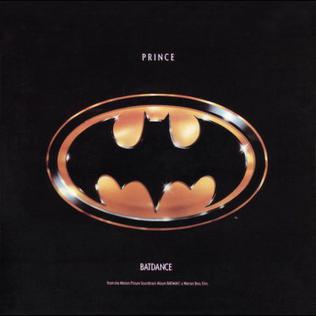
"Batdance" is a song by American musician Prince, from the 1989 Batman soundtrack. Helped by the film's popularity, the song reached number one in the US, becoming Prince's fourth American number-one single and served as his first number-one hit since "Kiss" in 1986.
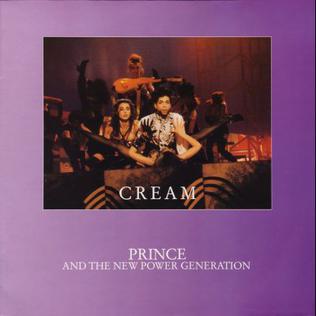
"Cream" is a song by American singer-songwriter Prince and his backing band the New Power Generation, released in September 1991 as the second single from Prince's 13th studio album, Diamonds and Pearls (1991). In a 2004 MTV special, Prince joked that he wrote the song while looking at himself in the mirror. "Cream" became Prince's fifth and last number-one single on the US Billboard Hot 100, staying at the top for two weeks. The song entered the top 10 in 15 other countries worldwide, peaking within the top three in Australia, Canada, Norway, and Switzerland. Its music video was directed by Rebecca Blake.
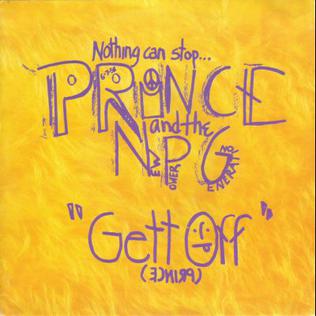
"Gett Off" is a song written and produced by American musician Prince, released in June 1991 as the lead single from his thirteenth album, Diamonds and Pearls (1991). The album was his first with his backing band the New Power Generation. "Gett Off" was a hit on both sides of the Atlantic, reaching number four in the United Kingdom; the maxi-single was too long and pricey to appear on the UK Singles Chart, so this release was classified as an album, peaking at number 33 on the UK Albums Chart in August 1991.

"New Power Generation", or "N.P.G.", is a song by American musician Prince from the 1990 album and film Graffiti Bridge. It is an anthem for his backing band, The New Power Generation, who were officially co-credited on his album covers for a time, and continued to back him up until 2013, albeit with a changing lineup. The song saw minimal chart attention, and was not as successful as its predecessor, "Thieves in the Temple".
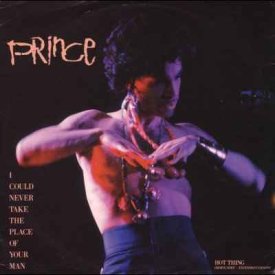
"I Could Never Take the Place of Your Man" is a song written and recorded by American musician Prince. It was released as the final single from his ninth studio album Sign o' the Times (1987), becoming the third top-ten hit off the album. It has since been covered by numerous artists.

"Thunder" is a song by American musician Prince and the New Power Generation, from their 1991 album Diamonds and Pearls. It was issued as a limited, individually numbered 12-inch single picture disc in the UK and Ireland only, and the edited version was available only on the promotional single.

"7" is a song by American musician Prince and the New Power Generation, from their 1992 Love Symbol Album. It was released in late 1992 as the third single from the album, and became the most successful in the United States. It features a sample of the 1967 Lowell Fulsom song "Tramp" and is composed of heavy drums and bass in an acoustic style. It has a distinct Middle Eastern style of music, and a Hindu reincarnation theme, and an opera-like chorus which features Prince's multi-tracked vocals. The lyrics have religious and apocalyptic themes. The song is ambiguous and can be interpreted in many ways, as the "7" mentioned in the chorus could be the song referring to the Seven Deadly Sins or the seven Archon of Gnosticism or the seven names of God in the Old Testament. The song received positive reviews and peaked within the top forty of many of its major markets.

"Space" is a song by American musician Prince from his fifteenth album, Come (1994). The B-side of the single is actually the album track. The A-side is the Universal Love Radio Remix of "Space", with completely new lyrics.

"Gold" is a song by American musician Prince, his stage name at that time being an unpronounceable symbol, and was released as the third single from his seventeenth studio album, The Gold Experience (1995). Obviously proud of the song, Prince touted it as the next "Purple Rain" to reporters before the album's release.

"The Greatest Romance Ever Sold" is a song recorded by American musician Prince, under his unpronounceable stage name called the "Love Symbol". It was released as the only single from his twenty-third studio album Rave Un2 the Joy Fantastic (1999). It was issued on October 5, 1999, in several different formats, including a 12-inch single, CD single, and a maxi single. Prince solely wrote and produced it, while Mike Scott provided guitar strings for the track. Several music critics found the single reminiscent to the works on his previous studio album, Diamonds and Pearls (1991).
"How Come U Don't Call Me Anymore?" is a song by Prince. It is a ballad of romantic longing with some gospel elements. On his original recording of the song, which was released as the non-album B-side to his 1982 single "1999", Prince performs most of the song in his falsetto range, with his own bluesy piano playing providing the only instrumental accompaniment. The song's first album appearance was on his 1993 compilation The Hits/The B-Sides. It was later included on the soundtrack to the 1996 film Girl 6. Prince also performs the song on his 2002 live album One Nite Alone... Live!.

"Get Wild" is a song by the New Power Generation, and the first single from their 1995 album Exodus. The song was a hit in the UK, reaching number 19 in the UK Singles Chart.

"Love Sign" is a song by American musician Prince, from the 1-800-NEW-FUNK compilation album released by his independent record label NPG Records in 1994.
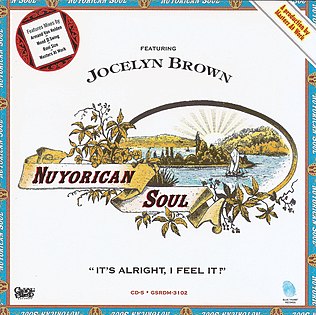
"It's Alright, I Feel It!" is a song by Nuyorican Soul, a project by the house-garage production and remix team of "Little" Louie Vega and Kenny "Dope" Gonzalez. It features American singer Jocelyn Brown, who also co-wrote it, and was released in 1997 as the third single from their debut album, Nuyorican Soul (1997). The song peaked at number 34 on the UK Singles Chart and number one on the UK Dance Singles Chart, while in the US, it reached number three on the Billboard Hot Dance Club Play chart. A music video was also produced to promote the single.


















